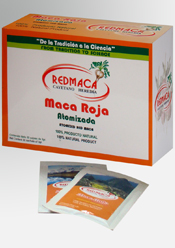

Antagonistic effect of Lepidium meyenii (red maca) on prostatic hyperplasia in adult mice.
Red Maca reduced prostate weight at 21 days of treatment. Weights of seminal vesicles, testis and epididymis were not affected by RM treatment. The reduction in prostate size by Red Maca was 1.59 times. The reduction in prostatic stroma area by RM was 1.42 times. Red Maca has an anti-hyperplastic effect on the prostate of adult mice when hyperplasia was induced with TE acting first at prostatic stromal level.
Effect of two different extracts of red maca in male rats with testosterone-induced prostatic hyperplasia.
A dose dependent reduction of prostate weight was observed with the increase of the dose of benzylglucosinolates in red maca extracts. CONCLUSION: The present study showed that hydroalcoholic or aqueous extract of red maca containing 0.1 mg of benzylglucosinolate can reduce prostate size in male rats in which prostatic hyperplasia had been induced by TE.
Dose-response effect of Red Maca (Lepidium meyenii) on benign prostatic hyperplasia induced by testosterone enanthate.
The prostate weight diminished in a dose-dependent fashion in rats treated with Red Maca. Serum testosterone levels were not affected by Red Maca. In conclusion, Red Maca administered orally in rats seems to exert an inhibitory effect at a level post DHT conversion, on the BPH-induced experimentally, although a direct measure of reductase action would still be required.
Red maca (Lepidium meyenii) reduced prostate size in rats.
Phytochemical screening showed that aqueous extract of Red Maca has alkaloids, steroids, tannins, saponins, and cardiotonic glycosides. The IR spectra of the three ecotypes of Maca in 3800-650 cm (-1) region had 7 peaks representing 7 functional chemical groups.
Highest peak values were observed for Red Maca, intermediate values for Yellow Maca and low values for Black Maca. These functional groups correspond among others to benzyl glucosinolate. CONCLUSIONS: Red Maca, a cruciferous plant from the highland of Peru, reduced ventral prostate size in normal and TE treated rats.
The Methyltetrahydro-{beta}-Carbolines in Maca (Lepidium meyenii).
Maca, a plant native to the Peruvian highlands, contains (1R,3S)-1-methyl-1,2,3,4-tetrahydro-beta-carboline-3-carboxylic acid (MTCA). The family of the tetrahydro-beta-carbolines has been associated with both biologically helpful and harmful compounds. We present evidence that MTCA is a natural constituent of Maca, and on consumption no toxicity is found. This suggests that, when consumed as multi-component, MTCA may loose its adversity as drug action.
Effect of chronic treatment with three varieties of Lepidium meyenii (Maca) on reproductive parameters and DNA quantification in adult male rats.
Yellow and Black Maca increased epididymal sperm count after 84 days of treatment without affecting DSP. Maca seems to act as a modulator of sperm count at the reproductive tract level.






